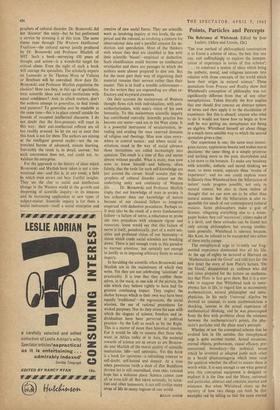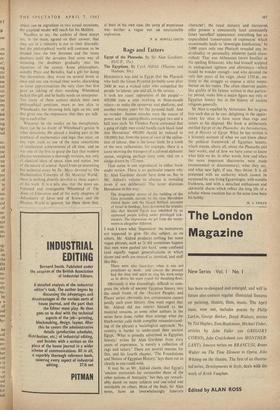Points, Particles and Percepts
The Relevance of Whitehead. Edited by Ivor Leclerc. (Allen and Unwin, 42s.)
'Tun true method of philosophical construction is to frame a scheme of ideas, the best that one can, and unflinchingly to explore the interpre- tation of experience in terms of that scheme';
. . to construct a system of ideas which bring the aesthetic, moral, and religious interests into relation with those concepts of the world which have their origin in natural science.' These quotations from Process and Reality show that Whitehead's conception of philosophy was not significantly different from that of any other metaphysician. Taken literally the first implies that one should first concoct an abstract system of terms and then apply it to the elucidation of experience. But this is absurd; anyone who tried to do it would not know how to begin or how well he was getting on, metaphysics not being an algebra. Whitehead himself set about things in a much more sensible way to which the second quotation gives a clue.
Our experience is one; the same man investi- gates nature, appreciates beauty and makes moral decisions; the same thing is a simple primrose and nothing more to the poet, dicotyledon and a lot more to the botanist. To make any headway with scientific, aesthetic and moral thinking we must, to some extent, separate these 'modes of experience'; and no one could explain more brilliantly than Whitehead how the 'bifurcation of nature' made progress possible, not only in natural science, but also in those realms of thought that we can now see to be other than natural science. But the bifurcation is also re- sponsible for much of our contemporary cultural malaise. Some philosophers make a god of Science, relegating everything else to a waste- paper basket they call 'mysticism% others make of it a devil; and these attitudes can be found not only among philosopher's but among intellec- tuals generally. Whitehead is relevant because, like Kant, he refused to be stampeded into either of these tetchy camps.
The metaphysical urge to re-unify our frag- mented experience dominated him all his life. At the age of eighty he lectured at Harvard on 'Mathematics and the Good' and told (not for the first time) the story of how Plato's lecture, 'On the Good,' disappointed an audience who did not come prepared for the lecture on mathema- tics that Plato in fact gave them. But it is a mis- take to suppose that Whitehead took to meta- physics late in life, to regard him as successively mathematician, natural philosopher and meta- physician. In his early Universal Algebra he showed an unusual, to some mathematicians a shocking, interest in the actual experience of mathematical thinking; and he was preoccupied from the first with problems about the relations between the mathematician's points, the phy- sicist's particles and the plain man's percepts.
Whether or not the conceptual scheme that he evolved late in life satisfies this metaphysical urge is quite another matter. Actual occasions, eternal objects, prehensions, causal efficacy, pre- sentational immediacy—the technical terms which he invented or adapted jostle each other in a heady phantasmagoria which must raise the question whether the effort to master them is worth while. It is easy enough to see what general area this conceptual equipment is designed to explore; it is the One and the Many, universal
and particular, abstract and concrete, essence and existence. But when Whitehead clears up the mystery of how two things can both be (for example) red by telling us that the same eternal
object can be ingredient in two actual occasions, the sceptical reader will reach for his Moliere.
Needless to say, the authors of these essays arc, in the main, agreed on their answer; that they are in a minority is not to their discredit; but the philosophical world will continue to be divided into the few devotees and the many doubters until the devotees find some way of initiating the doubters gradually into the mysteries of the system. Some philosophers. notably Plato and Berkeley, had a gift for doing this themselves; they wrote on several levels at once and one can re-read their works, discarding as looSe approximations the very clues that first gave an inkling of their meaning. Whitehead lacked this gift and he badly needs an interpreter. To many of these authors sketch their own philosophical positions, more or less akin to Whitehead's. but throwing little light on his; and this gives one the impression that they are talk- ing to each other.
Whatever be the verdict on his metaphysics, there can be no doubt of Whitehead's genius in other directions, He played a leading part in the synthesis of mathematics and logic that must, on any view, rank as one of the most remarkable
of intellectual achievements of all and he was one of the first to grasp the fact that modern physics necessitates a thorough revision, not only of classical ideas of space, time and matter, but of the nature of science. Apart from an interesting but technical essay by Dr. Mays devoted to On Mathematical Concepts of the Material. World,. there is nothing directly devoted to these aspects of his work. It is a pity also that the more un- buttoned and manageable Whitehead of The Aims of Education and of the early chapters of Adventures of Ideas and of 'Science and the Al tqleri7 lfWrlt1 is ignored: for these show that, at least in his own case, the unity of experience was neither a vague nor an unattainable aspiration.
P. H. NOWELL-SNIITH







































 Previous page
Previous page